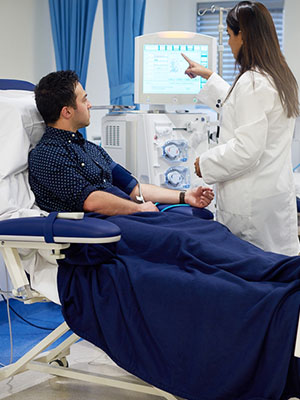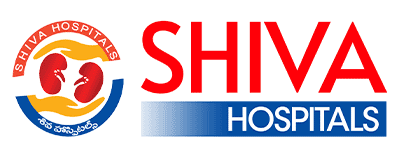People with chronic kidney disease are unable to attain natural filtration of the blood due to loss in kidney function, the alternate is the use of dialyzer also called as an artificial kidney which works to filter the blood of the body. The machine is connected by an access in the blood vessels by which blood can be filtered. This access is usually given by a minor surgery.
The dialyzer separates the blood using a thin membrane through which proteins and other important aspects of the blood cannot pass by and only waste in the blood such as urea, creatinine etc which are extremely small in size are able to pass through successfully thereby filtering the blood.
Common causes of why kidney has failed and needs dialysis at hemodialysis hospitals in Guntur are:
- Diabetes
- Hypertention
- Glomerulonephritis or inflammation of kidney
- Inflammation of blood vessels or vasculitis
- Polycystic condition of the kidney

There are certain aspects to keep in mind while undergoing dialysis at nephrology hospitals in Guntur,first being the diet, strict discipline must be followed as to what to eat and what not to eat. Is it advised to have a thorough discussion with the kidney specialist at dialysis hospitals in Guntur to know what kind of diet needs to be followed. Other important aspect is the dialysis appointments for dialysis treatment in guntur, ensure no appointment is missed.
Some known complications or side effects of dialysis include:
- Low blood pressure
- Muscle Cramps
- Itching
- Sleep Disorders
- Bone Disease
- Anemia
- Excess fluid in body
- High levels of potassium
- Access site issues such as infection, inflammation or blockage
CRRT
CRRT or Continuous renal replacement therapy is a type of dialysis that is typically used for people who are severely ill or are suffering with acute kidney injury. This is a 24 hours process and is also suitable for patients with extremely unstable blood pressure and fluctuations in heart rate who are usually deemed unfit for hemodialysis. In continuous renal replacement therapy, the blood is made to pass through a unique filter which clears out all the toxins and unnecessary substances and returns clean blood to the body. CRRT is a slow and steady process which puts relatively lesser pressure on the heart.
CAPD
CAPD or Continuous Ambulatory Peritoneal Dialysis in Gunturis a kind of dialysis in which a machine is not needed, instead two pouches of clear fluid is placed in the abdominal cavity and the dialysis or filtration takes place. This fluid post dialysis consists of waste removed from the body and this waste is drained and thrown away. People undergoing Continuous Ambulatory Peritoneal Dialysis usually have around three to four rounds of filtrations done in a day. Certain dietary restrictions might need to be followed to ensure blood pressure is at an acceptable level. The process of taking care of the dialysis can be learnt by the nurses. Consult Dr. Siva Nagendra Reddy at dialysis centers in Guntur.
Peritoneal Dialysis
Peritoneal dialysis is different from the standard dialysis procedure. In this technique the cleansing fluid is sent through a catheter tube into the abdomen. The peritoneum of a thin lining present in the abdomen acts as the filtering apparatus and filters the waste products from the blood. After the known amount of time that is known to complete the filtration, the fluid containing the waste materials are collected and drained out of the body. To handle peritoneal dialysis, the person needs to be able to take care of themselves and must have the ability to handle these fluids and their replacements on time. Get the best kidney failure treatment in Guntur from best doctors of dialysis in Guntur.
Plasmapheresis
Plasmapheresis is a type of cleansing process which cleans the plasma or clear part of the blood. This plasma contains the antibodies which harm the immune system. During plasmapheresis, plasma is separated from the blood and cleansed of the antibodies before resending into the blood, in the event that the plasma cannot be cleaned, a substitute for plasma is used such as a saline solution. Plasmapheresis can be used to treat a wide range of disorders such as Myasthenia Gravis, Guillian-Barre syndrome and sickle cell disease as well as many more such conditions. Catheter or needle can be used to carry out the plasmapheresis process.

